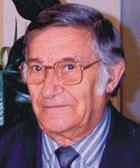
N. in Sant Celoni, (Spain) on September 28, 1911 in San Celoni (Barcelona, Spain), in the bosom of a catholic-roman family. He studied for the priesthood of the Church of Rome. He graduated and received his doctorate in dogmatic theology from the Pontifical University of Salamanca. After his priestly ordination in the Cathedral of Tarazona he held the positions of Bishop Coajutor, Professor of the Diocesan Seminary and Magisterial Canon. His conversion to the evangelical faith took place at the end of 1961, on October 16, thanks to the mediation of the pastor and writer Samuel Vila (v.). In 1962 he moved to Barcelona, where, in the morning, he had the satisfaction of attending for the first time the religious service of an evangelical church, and in the afternoon, in the church of Tarrasa. After having renounced all his ecclesiastical offices, he went to England, where he was received by Luis de Wirtz, at whose side he worked in the diffusion of the Gospel through radio messages through Radio Montecarlo and Radio ELWA. On June 27, he was baptized at the Holland Road Baptist Church in Hove-Brighton. He worked in evangelization and teaching with The Sentinel's Missionary Union, the Trinitarian Bible Society and the Strict Baptist Mission (today Grace Baptist Mission). The latter sent him as a missionary to Spain in 1969, in the company of his wife Enid-Beryle Beard, and his three daughters, to pastor the Baptist Church of San Eusebio Street several years later. He later moved to Guatemala where he was a professor at the SETECA (Central American Theological Seminary) Finally settled in Vigo, where among other teaching tasks in the Biblical Institute of Galicia, he devoted himself to the preparation of a Hebrew lexicon in its deepest roots and commentaries to various books of the New Testament, as well as deepen doctrines and themes such as predestination. After the death of his wife in 1997, he moved permanently to Bath, England with his daughters. He left for his celestial homeland on September 11, 2005 at the age of 93. Linked as a writer from the moment of his conversion to Samuel Vila and the CLIE Publishing House, his copious literary and theological production is full of quotes from authors of all times and schools, and, mainly, from biblical texts developed from their original idiomatic meaning. In the line of Ryrie (v.) And Chafer (v.) Maintains a premillennial dispensational eschatology. In soteriology it goes from his first Calvinism of Doctrines of grace to a more nuanced posture, with rectifications in some points. His main literary legacy was the Evangelical Theological Training Course, the translation into English of the Matthew Henry Biblical Commentary, and especially the revision of the Reina-Valera Bible - Revision 1977, coordinating the team that carried out the revision. At the advanced age of 82 he continued to write and wrote new notes to his book The Person and Work of Jesus Christ and wrote Pneumatology and Questions and Answers about especially difficult portions of the Bible. He also developed two courses of Hebrew, entitled Hebrew for beginners and Progressing in Hebrew.







